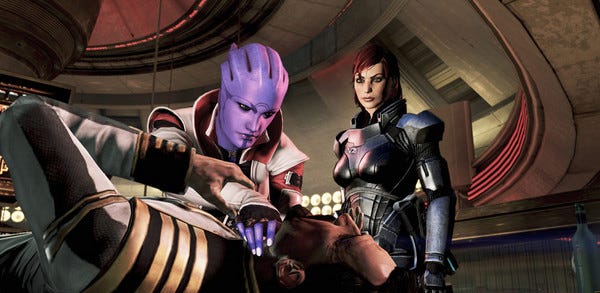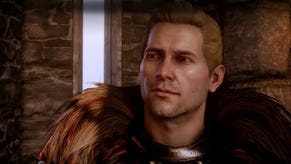BioWare's Heir On Sexism, Racism, Homophobia In Games
(Mass) Affecting Change
GDC was jam-packed with brilliant talks, and I missed far too many of them because infinity appointments beckoned. One of the absolute best I *did* see, however, was Mass Effect 4 designer Manveer Heir making an impassioned plea to developers for more diversity in games. He gave a talk equal parts well-reasoned and resolute, arguing not that all games should change their icky ways, but that our industry's predominate pattern needs to shift away from generic leads and hurtful stereotypes. "I sincerely hope that you are ready for that challenge, because I sure as hell am!" he bellowed before being mobbed by fellow designers. I caught up with Heir afterward to discuss some of his talk's finer points and how BioWare's become more sensitive to these issues as time has progressed.
RPS: One of my favorite arguments you ended up dissecting in your talk was the classic scapegoat of, "Oh, my fantasy game takes place in a setting kind of loosely based on Medieval Europe, therefore it must be sexist to be 'realistic.'" But clearly, that doesn't always have to be the case since, you know, fantasy.
Heir: I think that we fall into this default that medieval Europe Middle Ages is the baseline of how we start from fantasy, and so therefore we implement things like sexism against women where women are usually like prostitutes and subservient to men and often won't have fully fleshed out characters and they're very much oppressed.
I want to question why we always do that. Not why one individual game ever does that, but why most of the time there's a large pattern that keeps on emerging there. I think a lot of it is the cultural biases that we have. The implicit things that we're thinking about, we're not actively thinking about, it's just that's our default.
I think if we become more aware of that we can then make someone making a fantasy game go, "Whoa, do I need it to be that way? Why is that?" Because it is fantasy; it's not required. That is just how fantasy emerged and we just all started copying it with things we were all inspired from, but we could do better, we could rethink that and we could see how that's problematic and maybe avoid some of the problems. I believe that.
RPS: But then a lot of people hear that and - even with your very deliberate disclaimer - think you're suggesting that all games should never reference the less savory elements of that time period or infuse fantasy settings with them. And then everyone starts crying wolf over censorship. What can you really do at that point when people just seem to want to react that way?
Heir: Yes, I understand that push back, but I don't view it that way personally. I think any individual game should have the right to be whatever it wants to be. If it wants to be a game about oppressing women and that culture and it wants to comment on that, that's fine. It's more, to me, that every game shouldn't be that way. We need more representation across the board so you have to take a larger look at everything and see what is the pattern that emerges versus one individual game, but if we do that, we can hopefully improve.
But you know what? If a game… Yes, once you just go hard on the historical Middle Ages and then really try to build realism, that's fine, but also make sure you understand all the levels of the realism, like who we are. Who are the real women and people of colour that actually existed in the Middle Ages? They didn't not exist, but they're not represented even in film and books and things like that often.
RPS: I remember [Ubisoft Quebec narrative director] Jill Murray's GDC Next talk about that. Making games about women who went against the grain throughout history, especially given that women have been living and existing and doing stuff of their own accord since, you know, the beginning of time. There's more to history than just the few stories we hear over and over and over again in pop culture.
Heir: I touched on that in my talk where I was like, women in history, there are very powerful women who broke out of the mold. There are a lot of women who did not conform to the standards that you can find if you read historical books. Frankly, there are women that you will never know about because the books are mostly written by men and you don't get to find some of that. Someone even told me about a Tumblr that was people of color in the Middle Ages that was like, "Yeah, these people actually existed."
RPS: Right now sexism gets the most vocal focus in the gaming industry, but that's far from the only issue. Racism and homophobia are still without a doubt major problems that we need to tackle as well. What, in your opinion, is the next step there?
Heir: I think the advocacy track at GDC is a great start here. I think there's a conversation that's happening and that conversations are good, it's important, it's difficult, it's uncomfortable and those are all good things. But it's a start. I think we have all these problems. We have women who feel marginalized at conferences like this.
There was an incident, apparently, at a party where a woman got groped and that's highly inappropriate at a conference of professionals. I would love to be coming to a GDC where I don't hear that story. And that's cultural. We have to combat and rethink our culture as people and our influence on that culture as being makers of the things our culture consumes.
RPS: You argued that if we want to see a system change, well, this is an industry made up of people who design systems for a living. So make a new one, test it, change the rules, etc. How do you apply that mentality at BioWare?
Heir: I think it's the same things you could do at any company. It's not specific to Bioware. If you're working in an organization, first you notice a problem and you assert a discussion on it, an open and honest discussion, with people and see what others think. Maybe you would try to persuade them that you really think that they don't understand what their problem is. Then you come up with some solutions of like, "Hey, I think you're actually not realizing that you're depicting this gay person in a very stereotypical and negative way. Maybe here are some ways that we cannot do that while keeping the core of who this character is."
You can offer solutions. And frankly you've got to keep banging your head at it and try and get more people around you to help. For me, I'm very fortunately surrounded by super smart, very passionate people who think like this and we have these discussions frequently. So at that point it's just about persuading other people around us. That's not specific to one company, though. I think - and I hope - I can encourage it through the entire industry.
RPS: BioWare isn't perfect by any means, though. You've evolved a lot over the years - Mass Effect 3 was lightyears ahead of Mass Effect 1's paltry options for homosexual characters, for instance - but you're still working in triple-A. So you've got your share of male gaze-y female characters and whatnot. Where do you draw the line there? Where do you say, "We can include this in our game. This character being hyper-sexualized (or what have you) makes sense" versus "Hmm, maybe we're contributing to a problematic pattern here"?
Heir: You've got to speak up as a developer any time you see something that you don't like. I know I always do that. I'm the first person to go, "This is problematic for me and this is why," and you've got to at least bring it up and give someone the chance to fix the problem. Ultimately, we all have bosses in the world so unless you're a one person studio so you can try to influence it up, sometimes you may change people's minds and sometimes you won't. I think if you have the conversation in general, people's minds will get changed eventually - even if not in some specific instances.
RPS: I feel like indie development has taken a large lead in depiction of characters and cultures outside the traditional videogame mold. Can triple-A - large, creaky, and unwieldy as it is - close the gap any time soon?
Heir: The Last Of Us has won every major award that I can think of this year, it's widely considered to be the best game that came out last year on the triple-A release. GLAAD just gave them an award for one of their characters – I can't remember that guy's name, but he was gay and it was a positive gay representation because him being gay was not the primary focus.
So you don't have to make games about being gay. You can just make characters who being gay is a part of who they are because that's not the primary identity of them. So I think we can do things like that. I feel like that's coming out of the notion of challenging, like well, why does this character have to be straight? Couldn't he also be gay? It doesn't have to be important to the story, but it could just be part of his personality and it's, those people would exist in this world. I believe he's an evil character so those people should be morally bankrupt, or I believe he's good. Either way, those people can exist.
RPS: There is a vocal crowd in the gaming community that despises the idea of diversity in games, though. Or at least, they hate how much attention the conversation gets relative to how under-the-radar it used to be. But those people are also acclimated to very simple characters, and I have to wonder if they they think characters who are, for example, gay, transgender, or what have you will be entirely defined by that all the time.
Heir: I think we're still growing as a medium and when it comes to writing. I think there's been a major maturation in the last five years of our challenge in writing. Again, Naughty Dogs does amazing work. A lot of studios are starting to do really amazing work with narrative in games, at the triple-A level and at the indie level as well. You're starting to see them paying more attention - whereas back, I think 10, 15 years ago, it was like, "OK, there's a princess, go get her."
We're telling more cinematic stories now, and we're taking some of the Hollywood stuff and that can be problematic at times, but I still think that it's working and we're doing a good job with that. I think that's kind of moving away from the really simple characters that used to characterize gaming.
RPS: How has all of this gone for you, both personally and professionally? Have you witnessed change over time? To what degree have you experienced it yourself? I mean, I know I definitely didn't come up understanding how hostile the gaming industry was to many people. I had to learn it.
Heir: Absolutely. I think dialogue, I look at my own personal views on the world ten years ago and how highly problematic they were. I was coming out of college then, and I would use a lot of very vulgar slurs, not thinking about the effect that that could have on underrepresented people. But I grew up - in part because conversations happened around me and I was listening to them and I found myself thinking, "Well yeah, I actually agree with that completely, but oh, I didn't realize I was contributing to that problem. It's not that I was trying to. I'm not against that."
RPS: Your talk definitely showed that. But at the same time, it was part of something called the Advocacy track. I doubt people who don't already agree with you are going to show up for that kind of thing. How much do you think these sorts of talks help, really? Or rather, do they bring anyone new into the fold?
Heir: I think it all happens from conversations, so I'm a better person today because of the people that I listened to back when I was coming up and continue to listen to now, whether it's my friends, my family, or other people. Conversation in conferences and companies and stuff was a big part of that. I do think it can actually change and affect the culture.
RPS: Change has become something of an odd notion in modern society - especially on the Internet. No one ever forgets. If you carve out a persona as a problematic figure or make one big mistake, many people define you by it, rarely allowing room for the possibility of change, learning, or growth. I have to wonder if, witnessing that so frequently on a larger scale, it causes many people who'd otherwise be inclined to listen and grow to instead stick to their guns.
Heir: Yeah, it's a problem that anything you say will be around forever. I've seen that in the world, like mistakes I made or pictures of me doing stupid things in college exist forever. That's unfortunately the way the world works. You see it in the way politics works and things being dragged up from the past.
But I think rational people can understand that people are growing. We're growing every day, we're changing every day and I hope most of us are getting better every day. Me as a person, I can speak for myself, I would try to control the narrative of saying, "Look, if I did do something past, I'd acknowledge it, I would admit that I was wrong, I also use those things that I've done and here's how I can use them. Change."
I've heard and seen a lot of people like that in the industry who have said problematic things that either have changed or are trying to change or at least making an effort. Some will fail and some will succeed, but that's okay, they're willing to do the steps, willing to have the conversation around it as well.
RPS: Like Penny Arcade, which at least seems to be trying now, even if its efforts are somewhat misguided.
Heir: Unfortunately, I can't talk about that. BioWare has involvement with Penny Arcade and PAX and stuff like that.
RPS: A lot of game studios are still predominately staffed by straight white men, which can sometimes lead to a fear of representing more diverse characters and ideas. Like, most devs aren't bad or even ignorant people, but I think many of them go, "Oh, I can't speak to that life experience. I might mess it up big time." So they don't even try.
Heir: That's the harder problem because for one we need to diversify the workforce. I didn't even talk about that. That's a whole different problem with getting more women, more minorities. It's almost a catch-22: we only represent certain characters, less people of color, less LGBQT, less women might play games or get into games or at least want to work in games and therefore the cycle continues, so we have to find ways to fix that diversity in the workforce problem and I don't have solutions for that, to be frank.
The second is, men write women characters all the time, sometimes very, very poorly, but sometimes very well. That usually happens out of research and challenging your biases, running your stuff by people who, maybe, are from that representative and being like, "Am I making a mistake here? Am I thinking about this in a stereotypical way? Is there an assumption I'm making as a man? Am I looking at you with a male gaze?"
I think we can achieve that by - we're talented people in this industry, we're really highly talented people. If we can build crazy cover systems and we can build branching narratives or we can procedural worlds, you're telling me we can't fix that problem in writing? We just have to make an effort. We don't often make an effort. It’s the path of least resistance, is how we do it. So I want to challenge the idea that that needs to be the path of least resistance, or even say that it definitely should not be.
RPS: Games also have potential to be a powerful tool for empathy, given that they can allow us to live someone else's experience. Stepping into somebody else's shoes can be healthy and educational, but it's also like... should groups that have already been oppressed or marginalized have to take the responsibility of educating people who, by all means, have treated them terribly?
Heir: No, they shouldn't have to and there's also a thing where basically, a lot of those groups probably don't want to play games where they're also oppressed when that's what they deal with in real life. I sit and I talk to all these groups that deserve the ability to participate in fantasy construction. Most of our games are fantastical in some way or another, and so it doesn't have to be about that impression of it.
It could be empowering or it could just a trait. I haven't actually played it, but I believe Rogue Legacy has a trait where you're gay and I think it makes no difference at all. It changes nothing, but you can have it. I was like, that's hilarious. It's a funny commentary. It probably takes very little time to do and I think that's a nice little nod. I'm not saying that's the full extent that we should ever go to, but that's one way to go.
RPS: Do you think things are headed in a good direction overall? I've asked a lot of people this question during GDC, and responses have been all over the place, from emphatic yeses to, "I barely feel comfortable walking the show floor."
Heir: I think they're improving. Slowly. I don't think we're anywhere close to good yet. I think we're not terrible, but we're probably bad. This is where I would want it. So we're making small steps, but we could be making so much faster, and I think the conversations start with that. There's obviously going to be push back, but I think if we keep doing it we'll keep making those steps. And if we keep being cognisant then we can make larger and faster steps.
I think momentum happens at some point. Then all of a sudden people are like, "Well, yes, why can't I have another really strong woman character hero? And why can't she be gay? Why can't I be a transgender character? Or why can't I express myself in whatever way I want in a game? Why is my only option binary gender?"
RPS: Thank you for your time.
























